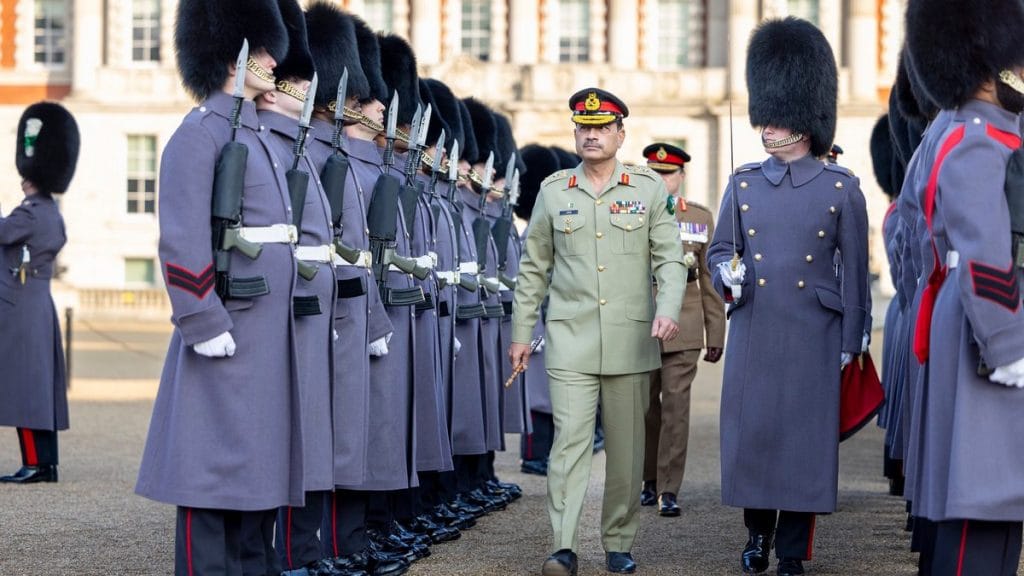Looks like Pakistan’s Army Chief, General Asim Munir, doesn’t tire of visiting the United Kingdom. His mid-February trip was the third time he’s visited the country since assuming his position in 2022. He is certainly not the first army commander to make frequent visits to London. From Generals Sher Ali Khan Pataudi and Ayub Khan to Ashfaq Parvez Kayani, Pervez Musharraf, and Qamar Javed Bajwa, there’s hardly a senior commander who doesn’t have close family ties, personal stakes, or some form of dependence on the British establishment.
This is also what folks in the British Foreign, Commonwealth and Development Office (FCDO) likely view as their country’s soft power, especially as far as Pakistan is concerned. These ties are not just historic but keep evolving due to the personal interests of Pakistan’s ruling elite—something even Pakistan’s best-est friend China is unable to replicate.
Munir’s close links with London are an extension of the historic relations that the army has with the British military. However, it has also become an important station for him as far as negotiating global geo-politics for Pakistan is concerned.
While Pakistan also has a dialogue based on counterterrorism with the United States, Rawalpindi seems more comfortable discussing the terrorism problem in Afghanistan and Pakistan—and much more—with the British. Although the latest trip had the official cover of Munir attending the 7th Regional Stabilisation Conference at Sandhurst, it seems the intention was also to discuss the rapidly evolving geopolitical situation, particularly Europe’s tension regarding the fate of Ukraine.
Also Read: Asim Munir is reversing Bajwa’s LOC passivism. Militancy is coming back to Kashmir
UK-Pakistan talking points—Ukraine to Delhi
Some sources I spoke with in London were of the view that Munir is keen to find a role for Pakistan, especially if there’s any European or British plan to send a peacekeeping force to Ukraine to establish some kind of balance vis-à-vis Moscow.
Given Islamabad’s fairly stable relations with Russia and good ties with the UK, Pakistan could be a contender for such a role. Much of what will happen with Ukraine depends largely on British Prime Minister Keir Starmer’s upcoming visit to the United States, which isn’t keen on the prolonged war with Russia. But Pakistan’s Army Chief would certainly want to put his army’s name forward, in case help is needed. He would also hope that London might put in a word for Pakistan with the Americans, about whom Islamabad is not so confident.

It’s worth noting that Britain is probably one of the few countries at present with whom Pakistan has a good working relationship, possibly giving it more time than even Saudi Arabia.
Since taking over as the Army Chief, Asim Munir seems to have heavily invested in the bilateral relationship. This includes giving significant projects to British companies. For example, NGOs working closely on climate change and water issues told me about a Scotland-based consultancy firm that is developing plans for activating a workable strategy for water conservation and streamlining of Pakistan’s rivers under the broader title ‘Living Indus,’ a major project supported by the United Nations Environment Program. The initial plan for the project was conceived by the Sindh government in 2022. Apparently, developing agriculture is one of Munir’s pet projects, making water conservation and exploring new water sources something close to his heart. Of course, this is just one of many significant consultancies through which British companies are finding opportunities to explore Pakistan’s potential.
Speaking of ‘regional stabilisation,’ he would certainly have spoken about ties with India and communicated his unhappiness with what he views as India’s involvement in fuelling insurgency in Balochistan. One is quite sure that Delhi’s concerns would have been communicated to him as well.
But the important fact is that at this juncture, the British Foreign Office seems to be the only key international player engaged with establishing some form of dialogue between the two neighbours, even at a time when neither is interested in a direct conversation. According to sources, a track-2 dialogue between some significant Indians and Pakistanis was set to take place in London after Munir’s departure last week.
Also Read: US sanctions on Pakistan have lost their bite. They can’t do much to stop defence planning
An unwelcoming diaspora
However, the more interesting aspect of Munir’s visits, especially since he took over as commander, pertains to his inability to engage with Pakistan’s diaspora in the UK. General Qamar Javed Bajwa was certainly the last army chief who could access British Pakistanis in the UK.
During his latest visit, Munir kept himself busy with official tasks, partly because Pakistan Tehreek-e-Insaaf (PTI) supporters took out a protest rally. In fact, this seems to be a pattern of his London visits, where he is unable to roam freely for fear of facing violent or abusive outbursts.
February 20, 2025 – London
British Pakistanis staged a protest outside the London High Commission against General Asim Munir's visit to the UK.
"ظلم کے یہ ضابطے ہم نہیں مانتے!"#LondonProtest #YahyaKhanPart2 pic.twitter.com/jYSLhvSZSX
— Dehatee دیہاتی (@SaleemKHI_PK) February 20, 2025
Notwithstanding that Munir seems to firmly believe he has the panacea for all ills that Pakistan suffers from, this perception does not have many takers among the diaspora or back home. In fact, Munir and his institution continue to face resistance, though relatively gentle, wherever they attempt to market their capacity.
Pushback at home
A recent example of resistance to the army was encountered by the Director-General Inter-Services Public Relations (ISPR), Lt Gen Ahmed Sharif Chaudhry, during his visit to the elite Lahore University of Management Sciences (LUMS). Not only did some students protest the visit, raising slogans against the army’s political, economic, and social interventions, but many in the audience also asked biting questions.
Obviously, this made the ISPR extremely unhappy; some sources from Lahore have claimed an inquiry has now been launched against some members of the LUMS faculty for failing to keep the students under control. Being a private university of good standing, LUMS may not get the same treatment as public-sector universities, but its faculty and students will now have to be more watchful.
The army under Asim Munir appears to see itself as being on a mission to set Pakistan on the right track, a developmental path that will get it noticed globally. For this, it may not want to spare the rod in disciplining its population.
This implies greater human rights violations and issues that are likely to attract international attention. One wonders how easy it would be for London to ignore the state of democracy or human rights in Pakistan.
Most probably, Munir is not scared.
Given the anxiety that has beset the world since American President Donald Trump’s takeover in Washington and the growing geopolitical uncertainty, Pakistan’s army echelons likely feel they now have greater space than before. Still, balancing geopolitics against democratic and human rights principles is something London may have to evaluate more carefully now.
Ayesha Siddiqa is a senior fellow at the Department of War Studies at King’s College, London. Views are personal.
(Edited by Asavari Singh)






